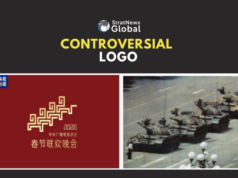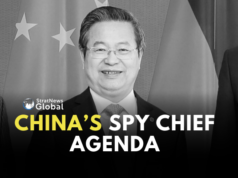‘Reforming’ Hong Kong
China’s lawmakers want Hong Kong’s electoral system ‘reformed’, a move overwhelmingly endorsed at the fourth session of the 13th National People’s Congress (NPC). The Election Committee of Hong Kong Special Administrative Region (HKSAR) will undergo changes in shape, size and composition, with a new committee set up to vet qualifications of election candidates. The committee is responsible for choosing Hong Kong’s chief executive and many members of the legislative council so this could effectively mean Beijing-backed loyalists would run Hong Kong.
China believes the legislation will help Hong Kong make the transition from “chaos” to “stability.” “The decision will help form a new democratic electoral system suited to Hong Kong’s realities and with Hong Kong characteristics,” said Qi Pengfei, a researcher on Hong Kong at the Renmin University of China.
Source: Xinhua & Agencies
Quad To Squeeze China Economically?
The U.S. may be trying to contain China through the Quad or the “Asian Nato” but given differing demands and political religious differences it may be impossible for these nation states to come together. Experts in China point out that the chaotic domestic situation and strong bipartisan division within the U.S. has ensured that President Biden wants other nations to play the role of containing China. However, they believe that the U.S. does not realise other countries are using it to fulfil their goals. The result, in their minds, will be chaos.
Another concern is apart from the bid to strategically contain Beijing, the Quad virtual meeting will be a talking shop on how to reduce economic dependence on China. China produces around 60 per cent of the world’s rare earth which is used in everything from iPhones, electrical car motors, military jet engines, satellites etc. There is talk that Quad member nations are looking to form a “rare-earth procurement chain” which can be disastrous for Beijing if it fructifies. Currently, rare earth is being used as a bargaining chip by Beijing in the ongoing China-U.S. trade talks.
Source: Global Times & Agencies
U.S. Won’t Repay Chinese Debt?
There’s furore in China over a proposed legislation in the U.S. to stop further debt repayments to Beijing. According to a report in ‘Fox News’ Republican Rep. Brian Mast is expected to introduce a bill to withhold debt repayments to China to punish it for its mishandling of the Covid-19 pandemic.
“The United States and other countries should permanently withhold payments on debts owed to the People’s Republic of China in amounts equal to the public costs incurred by such countries relating to COVID-19,” the bill reads.
The U.S. currently owes China $1 trillion dollars.
The Chinese media says it’s yet another move by the U.S. to take attention away from its “messed up” performance in tackling the pandemic. A report quotes Ray Dario, founder of Bridgewater Fund, the world’s largest hedge fund stating, that if the U.S. does refuse to pay China, it could start a “capital war.” The report also quotes other people in the U.S. stating that such a move could prompt Beijing to stop lending, which would spell disaster for the U.S. economy. The Chinese media quoted foreign ministry spokesperson Wang Wenbin as saying the U.S. accusations were “groundless” and China’s fight against the pandemic was “open, transparent and clear”.
Source: sohu.cn & Agencies
Post-Pandemic, Global Economy Will Rely On China?
China has claimed that its “foreign trade” and “resilient economy” will give confidence to its trading partners and boost a global economic recovery. The General Administration of Customs (GAC) said the country’s imports expanded 41.2 per cent year-on-year to US $834.49 billion in January and February. Meanwhile, exports soared 60.6 per cent year-on-year to $468.87 billion, the GAC reported.
According to Diane Swonk, chief economist at Grant Thornton: “China has become an even larger export platform post-pandemic than it was prior. Part of that is due to the outsize role it plays in the production of PPE. Another reason is that moving manufacturing facilities back to the US never occurred.” Some experts believe the gains are now showing. China has surpassed the United States to become the EU’s top trading partner; it remains Africa’s largest trading partner for 11 years.
Source: www.china.org.cn
Vaccine Diplomacy For Geopolitical Interests?
China has decried concerns it’s pushing COVID-19 vaccines to gain strategic leverage. Guo Weimin, spokesperson of the fourth session of the 13th National Committee of the Chinese People’s Political Consultative Conference (CPPCC), said such accusations were “narrow minded” and sought to undermine China’s efforts to act for the “global public good.”
Concerns have arisen in the West over the large-scale outreach of Chinese vaccines. Supplying statistics, Guo said that as of the end of February, China had provided vaccine-related assistance to 69 countries and two international organisations as well as exported vaccines to 28 countries. China has also joined COVAX, a global initiative aimed at promoting equitable access to COVID-19 vaccines.
India has had great success with its vaccine diplomacy but it doesn’t invite the scrutiny that Chinese vaccines do in the West. An article in ‘Foreign Affairs’ pointed out that China was making no secret of its technological prowess through the vaccine rollout and thus challenging the US. “The United States is no match for China in terms of concentrating power to accomplish big things,” a Chinese virologist was quoted as saying in the article.
This aside, the vaccine rollout has hidden commercial motives. Health developmental assistance is a low-cost way of pushing China’s pharmaceuticals across the world. The push towards BRI is also there with Beijing stating BRI nations will get priority on Chinese vaccines. This allows China to break into and challenge the western pharmaceutical industry. These concerns, coupled with a lack of transparency by Beijing on its Phase-III clinical trial results, add to the already high trust deficit over China’s role in the pandemic.
Source: www.chinadaily.com.cn/
Tik Tok To Ban Users Who Boast About Wealth
Chinese users of Tik Tok, Douyin— as the enormously popular short-video app is branded in China—have been warned that boasting about their wealth will get them banned from the site. In a notice Douyin said that six kinds of content including “flaunting of wealth” have now been barred as they promote “unhealthy values.” Close to 4,000 accounts have taken a hit for violations. The prohibition comes after the introduction of livestreaming regulations that highlighted wealth-flaunting as an issue last year, as well as the government’s recent call to spread more “positive energy” online.
The six banned categories include promotion of “money-worship”, using minors in videos related to luxury products and “showing off one’s social status in an inappropriate way,” which can include “making fun of the poor.” Fake video narratives of rags-to-riches stories will also result in an automatic ban as will images of extravagance such as throwing money in the air.
The ban is likely to hit a number of very popular Douyin accounts, some of which have millions of followers. In one such account, a makeup company makes videos about its young founder’s journey from poverty to prosperity. The account has nearly 2 million followers and has sold around 5,000 beauty products. Another hugely popular account shows the person conducting on-the-street interviews with Chinese youth who, when prompted, disclose the exorbitant prices of their clothing and accessories.
Source: sixthtone.com




